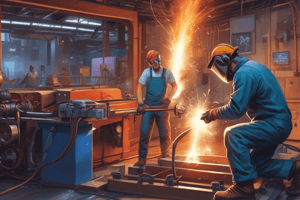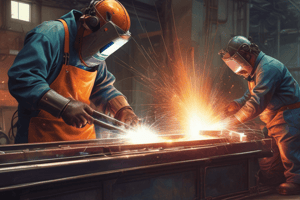Podcast
Questions and Answers
Explain the technical process of manufacturing and how it adds value to materials.
Explain the technical process of manufacturing and how it adds value to materials.
Manufacturing is the transformation of materials into items of greater value through processing and/or assembly operations. It adds value to the material by changing its shape or properties, or by combining it with other materials.
Define manufacturing as an economic process and provide an example related to hardware production.
Define manufacturing as an economic process and provide an example related to hardware production.
Manufacturing as an economic process refers to the production of hardware. For example, it includes the production of nuts and bolts, forgings, cars, airplanes, digital computers, plastic parts, and ceramic products.
List the three basic categories of engineering materials used in manufacturing and briefly explain their differences.
List the three basic categories of engineering materials used in manufacturing and briefly explain their differences.
The three basic categories of engineering materials used in manufacturing are metals, ceramics, and polymers. They differ in terms of their chemistries, as well as their mechanical and physical properties.
How does manufacturing add value to materials, according to the text?
How does manufacturing add value to materials, according to the text?
In the context of the course, what does manufacturing specifically refer to?
In the context of the course, what does manufacturing specifically refer to?
Explain the role of manufacturing in transforming materials into items of greater value, and provide examples of the types of items produced through manufacturing processes.
Explain the role of manufacturing in transforming materials into items of greater value, and provide examples of the types of items produced through manufacturing processes.
What are the three basic categories of engineering materials used in manufacturing, and how do their chemistries and properties differ?
What are the three basic categories of engineering materials used in manufacturing, and how do their chemistries and properties differ?
Discuss the economic and technical aspects of manufacturing, and how they contribute to the value addition of materials.
Discuss the economic and technical aspects of manufacturing, and how they contribute to the value addition of materials.
Provide a detailed explanation of the role of manufacturing in adding value to materials, with specific reference to the economic and technical processes involved.
Provide a detailed explanation of the role of manufacturing in adding value to materials, with specific reference to the economic and technical processes involved.
How does the process of manufacturing contribute to the economic transformation of materials into items of greater value, and how does it differ from the technical aspects of manufacturing?
How does the process of manufacturing contribute to the economic transformation of materials into items of greater value, and how does it differ from the technical aspects of manufacturing?
Study Notes
Importance of Manufacturing
- Throughout history, cultures that excelled at making things were more successful.
- Making better tools led to better crafts and weapons.
- Better crafts improved people's lives, and better weapons allowed for conquest in times of conflict.
- The history of civilization is largely the history of humans' ability to make things.
Definition of Manufacturing
- Manufacturing is the application of physical and chemical processes to alter the geometry, properties, and/or appearance of a starting material to make parts or products.
- It also includes assembly.
- Manufacturing is typically carried out as a sequence of operations.
Role of Manufacturing in Technology
- Technology is the application of science to provide society and its members with needed or desired products.
- Manufacturing is the essential factor that makes technology possible.
- All products that improve society and its members' lives are manufactured.
Studying That Suits You
Use AI to generate personalized quizzes and flashcards to suit your learning preferences.
Description
Learn about the history and significance of manufacturing in human culture with this quiz focused on Principles of Manufacturing Engineering MED 022. Explore how better tools and crafts have contributed to the success and development of civilizations over time.





